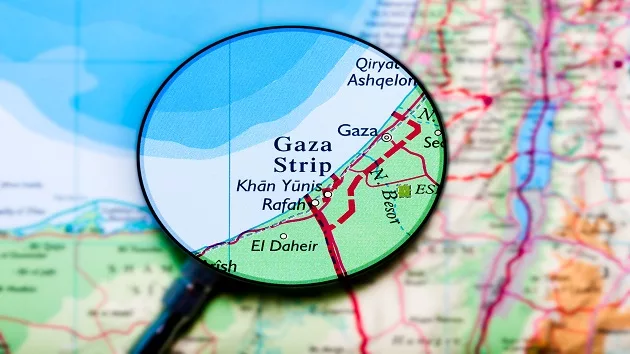(NEW YORK) — The U.S. military is once again suspending operations of its pier off Gaza, temporarily moving the floating structure to an Israeli port to ride out high seas and rough waves expected to hit the region in coming days, officials said Friday.
It’s the latest setback for the ambitious $230 million humanitarian project involving 1,000 US troops and the third time in a month that military officials have had to halt aid deliveries via the pier due to weather.
U.S. Central Command, which oversees forces in the region, said relocating the pier was necessary to prevent damage to the structure.
“The decision to temporarily relocate the pier is not made lightly but is necessary to ensure the temporary pier can continue to deliver aid in the future,” CENTCOM tweeted late Friday. “After the period of expected high seas, the pier will be rapidly re-anchored to the coast of Gaza and resume delivering humanitarian aid to Gaza.”
Complicating the matter is that humanitarian aid that has been transported ashore via the pier is being held at a nearby facility after the United Nations suspended deliveries last week due to security concerns. The U.N. said Friday it does not have a timeline for when distribution might resume.
The difficulties come as time is running out for the U.S. to make use of the temporary pier, which was initially slated as a 90-day project that would likely lose its ability to transit aid at the end of August, when heightened sea levels and more frequent storms would force military officials to take it down.
Announced by President Joe Biden in his State of the Union address in March, the project was supposed to bring some two million meals a day into hunger-stricken Gaza while Israeli officials held up aid trucks at ground crossings, citing security concerns that some of the aid could reach Hamas.
CENTCOM on Friday said that more than 3,500 metric tons of humanitarian aid have been delivered via the pier so far, with about 1,000 tons of that delivered in the past two days.
U.S. officials have acknowledged that much of that aid hasn’t made it to its distribution points. Still, they say the pier has been key in moving ashore much-needed aid that wouldn’t otherwise arrive and is intended to augment, not replace, aid moving via ground crossings.
While it’s the third time the U.S. military has paused shipments coming across the pier, it’s the second time the system – called Joint Logistics over the Shore, or JLOTS – has been relocated. The first time the pier was relocated, it had broken apart in rough weather and needed repairs. This time, the pier is being disassembled and moved as a precautionary measure to prevent damage.
The sputtering start has riled Republican critics who have called the pier an impractical political endeavor, rather than a serious foreign aid program.
“So far, the only accomplishment has been an increase in cost and risk for the 1,000 U.S. deployed troops,” tweeted Sen. Roger Wicker of Mississippi, the top Republican on the Senate Armed Services Committee.
GOP Rep. Mike Rogers of Alabama, who chairs the House Armed Services Committee, this week called the project an “irresponsible pier experiment” that needs to be “immediately terminated before catastrophe occurs.”
Citing the three service members who were injured while working on the pier, along with damaged Army vessels that ran aground, Rogers called it a waste of money and “an embarrassment for the administration.”
“This operation has failed and was never based in reality,” he said in a statement.
The Pentagon has defended the program as necessary to address a dire humanitarian situation.
“It’s pretty important for the people that are suffering right now … to get whatever aid they can by whatever means,” Pentagon Deputy Press Secretary Sabrina Singh told reporters in May when the pier was temporarily inoperable. “If you want to characterize it as a failure, I leave it to you. What I can tell you is that we don’t control the weather.”
Copyright © 2024, ABC Audio. All rights reserved.






